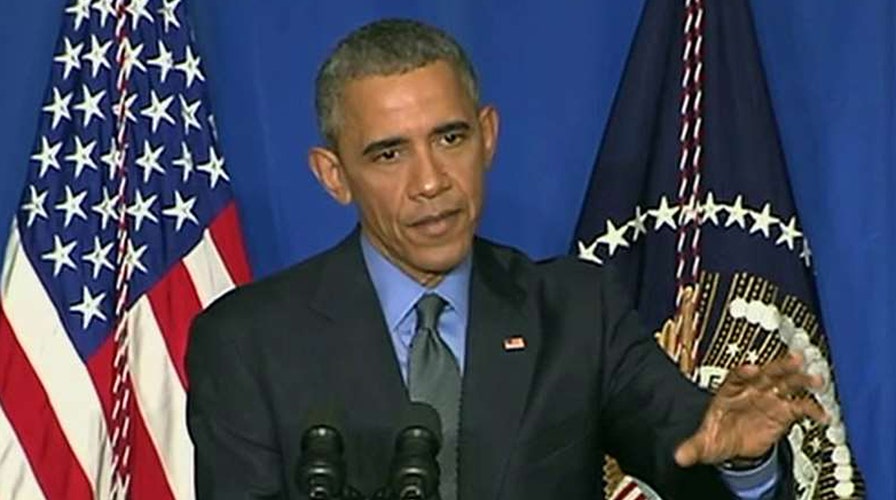President Obama defends ISIS strategy, global climate deal
Obama looking to forge stronger partnerships in ISIS battle
On Tuesday, President Obama stunned Americans and French alike with his false claims about gun violence in America. "I say this every time we’ve got one of these mass shootings. This just doesn’t happen in other countries,” claimed Obama. It is a claim that he has continually repeated over the years.
Talk about being self-absorbed.
The French have witnessed three mass public shootings this year. January saw two attacks, one on the Charlie Hebdo magazine and another on a Paris supermarket.
In the November attacks, 129 people were killed and 352 were injured. In just 2015, France suffered more casualties – killings and injuries – from mass public shootings than the U.S. has suffered during Obama’s entire presidency (508 to 424). This number includes the San Bernandino massacre on Wednesday.
In just 2015, France suffered more casualties – killings and injuries – from mass public shootings than the U.S. has suffered during Obama’s entire presidency (508 to 424). This number includes the San Bernandino massacre on Wednesday.
Obama also overlooks Norway, where Anders Behring Breivik used a gun to kill 67 people and wound 110 others. Still others were killed by bombs that Breivik detonated. Of the four worst K-12 school shootings, three have occurred in Europe. Germany had two of these — one in 2002 at Erfut and another in 2009 at Winnenden, with a total death toll of 34.
Obama isn’t correct even if he meant the frequency of fatalities or attacks. Many European countries actually have higher rates of death from public shootings that resulted in four or more murders. It’s simply a matter of adjusting for America’s much larger population.
Let’s look at mass public shootings from 2009 to the middle of June this year. To compare fairly with American shootings, I excluded attacks that might be better classified as struggles over sovereignty. For instance, I did not count the 22 people killed in the Macedonian town of Kumanovo last month.
Norway had the highest annual death rate, with 2 mass public shooting fatalities per million people. Macedonia had a rate of 0.38, Serbia 0.28, Slovakia 0.20, Finland 0.14, Belgium 0.14, and the Czech Republic 0.13. The US comes in No. 8 with 0.095 mass public shooting fatalities per million people. Austria and Switzerland are close behind.
In terms of the frequency of attacks, the United States ranks ninth, with 0.09 attacks per million people. Macedonia, Serbia, Switzerland, Norway, Slovakia, Finland, Belgium, and the Czech Republic all had higher rates.
There are two other studies on these questions that have gotten a fair amount of attention.
One, by State University of New York-Oswego public justice professor Jaclyn Schildkraut and Texas State University researcher H. Jaymi Elsass, who look at shootings across countries, has left out a large number of shootings in other countries.
Yet, despite the extensive news coverage their study has received, they miss a lot of cases. For example, in France, they miss three mass public shootings:
— Tours, France, October 29, 2001: four people were killed and 10 wounded when a French railway worker started killing people at a busy intersection in the city.
— Nanterre, France, March 27, 2002: a man kills eight city councilors after a city council meeting.
— Toulouse, France, March 19, 2012, Mohammed Merah killed four people (the killer also killed people in Montauban, France).
Other cases are missed in such countries as Austria, Belgium, Finland, Netherlands, Italy, Macedonia, Spain, Switzerland and Slovakia.
It takes a lot of time and effort to find all the cases, but if you get all the attacks in the U.S. and miss those in other countries, it makes the U.S. look a lot worse.
Another by Lankford reportedly goes back to 1966, but while he shares his study with reporters, he requires that they don’t share it with researchers in the area and, despite the wide publicity given his findings, he has repeatedly turned down requests by myself to see his research.
The president’s statement was also limited in another sense. He was referring only to shootings in his statement, but bombs are frequently used elsewhere in the world.
The Boston Marathon bombing was a rare exception these days in the United States. But countries such as Russia have frequently suffered bombings. Indeed, since 2009, the nation has seen 1.31 deaths per million from bombings that caused four or more fatalities.
Between 2007 and 2011, there was an average of 6,282 terrorist attacks per year outside of Iraq, Afghanistan and the U.S. On average, more than 27,000 people were killed, injured or kidnapped each year.
Obama keeps using these attacks to advocate requiring background checks on private transfers of guns. Such a requirement, however, already exists in France and almost all of Europe.
The background checks failed. So, too, did France and Belgium’s complete bans on the weapons used in those attacks. The terrorists who attacked those countries still got the weapons that they wanted.
Of the people stopped by background checks, nearly all are people who should have been allowed to buy guns. These delays may be mere inconveniences for most people, but they can endanger the lives of people who are being stalked and need immediate protection.
There is another common factor between mass public shootings. Virtually all of the attacks in America and Europe are taking place where general citizens can’t carry guns for protection. At some point, it has to become apparent to gun control advocates that gun-free zones only protect the killers.
Can Obama actually believe his claim that these attacks “just doesn’t happen in other countries”? More likely, Obama is willing to go to any extreme as he pushes for European-type gun control. The last thing he wants to admit is that countries with such strict gun-control laws can have so many deadly attacks.









































